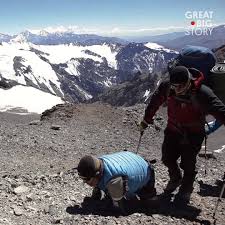“Do not go where the path may lead. Go where there is no path and leave a trail.” Ralph Waldo Emerson
January 11, 2012 – Mt. Kilimanjaro – Tanzania, Africa: 25-year-old Kyle Maynard lay in his tent at 6,400 feet and cried. His shoulders ached so badly he wasn’t sure he could go on. “I can’t do this,” Kyle told his mountain guide, Kevin Cherilla. I’m going to helicopter out in the morning. Crawl up a mountain? What was I thinking?” Cherilla advised Kyle to sleep on it. They would talk when he woke up.
Although 30,000 to 50,000 people attempt to climb Africa’s tallest peak annually, Kyle’s goal was unique. He wanted to be the first quadruple amputee to summit the 19,340-foot mountain without prosthetic devices. He planned to crawl up the mountain. The purpose of Kyle’s climb was to inspire children with disabilities that no obstacle is too great to overcome.
Kyle was born in Suwanee, Georgia, in 1986, with a rare condition known as congenital amputation. His arms ended in stumps at the elbows, and similarly, his legs at the knees. The Maynards treated Kyle like they treated his two sisters and made no special allowances for him. When he was six months old, they placed a ball on the floor, and he had to figure out how to crawl over to it. At 18 months, they strapped a spoon to his arm, and he eventually figured out how to feed himself.
Because Kyle’s father, Scott, had been a high school wrestler, Kyle started wrestling in the sixth grade. He struggled to get the hang of the sport, given his limitations, and lost his first 35 matches. When he cried and wanted to quit, his father wouldn’t let him. Instead, he lied to Kyle, telling him that he lost his first 35 matches, too.
Kyle stuck with wrestling and became a state champion at Collins Hills High School in Suwanee, winning all 35 matches his senior year. In high school, he also won the General Nutrition Centers World’s Strongest Teen Award for bench-pressing 240 pounds 23 times with the weights attached to his arms.
Kyle wrestled one semester at the University of Georgia before dropping out. In 2011, he announced that he planned to climb Mt. Kilimanjaro. He spent the next six months assembling a team and securing sponsorships.
Kyle began his climb of Kilimanjaro on January 6, 2012. He anticipated the ascent would take 15 days. Orthotic Specialists provided him with special custom-fitted rubber pads to protect his stumps. The terrain on the winding trail at the lower elevations was much more difficult than Kyle expected. By the fifth day, he was exhausted and discouraged, crying in his tent, and ready to give up.
The morning after Kyle’s meltdown, Kevin suggested that instead of following the trail as it wound its way up the mountain, Kyle should consider a shorter, more direct route straight up the side of the mountain. While the route was steeper and more dangerous, it would take some pressure off Kyle’s shoulders.
Encouraged by the suggestion, Kyle jumped at the idea. He changed his focus. Rather than looking up to see how far he had left to go, he frequently looked down to celebrate how far he had come.
On Day 8, when Kyle reached the snow line, custom-built snow chains were attached to his stumps so he could better grip the steep, icy terrain. On January 16, ten days after he began, Kyle made the final ascent to the summit, becoming the first quadruple amputee to do so.
His mother, Anita, says, “When Kyle told me he was going to climb Mt. Kilimanjaro, I thought he was joking. But Kyle’s been scaling mountains all his life, so why not Mt. Kilimanjaro? He may look disabled, but he’s not. He lives independently in Atlanta and has his own motivational company. He can type 50 words a minute on a regular keyboard, eat and write without special adaptations, and he drives his own vehicle.”
Kyle Maynard is a two-time ESPY Award Winner for Best Male Athlete with a Disability. He won the award in 2004 and again in 2012 in recognition of climbing Mt. Kilimanjaro. He has been inducted into the National Wrestling Hall of Fame and has been voted by the U.S. Jaycees as one of the Top Ten Outstanding Young Americans. He has written a bestselling book, No Excuses, and is a sought-after motivational speaker.
In February 2016, Kyle scaled 22,838-foot Mt. Aconcagua, the highest peak in South America. Kyle Maynard says, “I don’t make excuses. There has never been an excuse that has gotten us closer to where we want to go with our lives.”

Facinating story. Thank you for sharing.